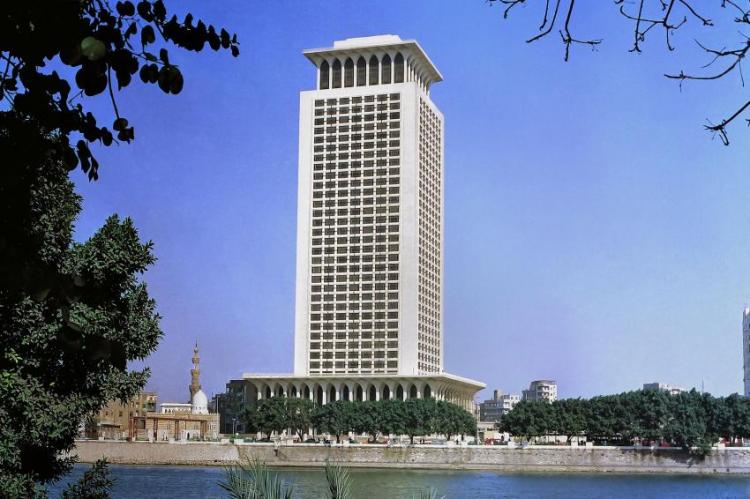Cairo musters its diplomatic power in the face of the Turkish intervention in Libya
Cairo – North-Press Agency
Muhamad Abu Zaid
During the past few days, particularly since the Turkish parliament agreed to send troops into Libya, as well as a five-party meeting on Wednesday, Cairo has been mobilizing its diplomatic strength in order to stand in the face of the Turkish intervention in Libya, and this was represented by a series of extensive contacts and meetings held by the Foreign Minister Sameh Shukri.
Egyptian contacts included European and Arab countries. It started with consecutive contacts made by Shukri with his Russian counterpart, the German National Security Adviser, and the U.S. Envoy to Libya on December 21st. The contacts included stressing the importance of working towards avoiding any aggravation of the situation in Libya, and pushing forward efforts to reach a comprehensive settlement for the Libyan crisis, including Berlin political track, and in a way that contributes to restoring security and stability in Libya.
Moreover, this was followed by Egyptian-American contacts, as well as contacts with Italy, Cyprus, Greece and Saudi Arabia, to coordinate on the status quo in Eastern Mediterranean, and to confirm the complete rejection of foreign interventions in Libya.
Furthermore, Cairo is seeking to form a new alliance in the face of Turkey’s ambitions, specifically in the Mediterranean, as it was revealed by these contacts and diplomatic efforts, as well as the five-party meeting which is scheduled to be held today, on Wednesday, the 8th of January, in the Egyptian capital Cairo, as it includes the foreign ministers of (France, Italy, Cyprus, and Greece, in addition to Egypt).
In turn, the member of the Foreign Relations Committee in the Egyptian Parliament, former Foreign Minister Amb. Muhammad al-Urabi, described his country's moves in this regard as it comes within the framework of legal international legitimacy and represent a defense of the Egyptian national security, after the controversial agreement signed by the Turkish President Erdogan with the Prime Minister of the Libyan Government of National Accord, al-Wifaq, Fayez al-Sarraj.
Al-Urabi considered that the Egyptian diplomacy deals with this file in a disciplined manner in light of the current strategic changes taking place in the region, proposing in the same context to launch an initiative – in cooperation with the European Union, and with a supportive decision by the Security Council – of which its primary goal is to control the Libyan coast and its access.
According to a statement issued by the Egyptian Foreign Ministry, the five-party meeting will discuss all the accelerated developments on the Libyan scene, and ways to push efforts to reach a comprehensive settlement that addresses all aspects of the Libyan crisis, and to confront whatever would hinder these efforts, in addition to discussing the overall situation in Eastern Mediterranean Region.
Nevertheless, the former intelligence agency's agent in Egypt, Hossam Khairallah has underestimated the value and influence of the Western stances of which he considered unreliable upon, given that Ankara has extensive relations with Europe. Besides, Turkey is a member of NATO, so Khairallah believes in the possibility that the Turkish move in Libya came as an implementation of agendas and plans of other powers.
"The current deadlock situation with Turkey is a political battle of various stages that represents the military tool at a certain stage, followed by other political and diplomatic steps, and it is accompanied by a strong media role from the beginning till the end." He said.
In the same context, Khairallah stressed the importance of observing maritime and air loading work of any combat members, whether from Turkey or northern Syrian, to monitor any maritime or air movements towards Libya or Egypt, as well as the coordination with Cyprus and Greece to follow these movements and monitor them by air and sea until they reach their final destination.
Two days ago, the Egyptian Foreign Ministry hosted a meeting attended by a number of European ambassadors and the American ambassador, to explain the Egyptian position regarding the Turkish interference in Libya. According to a statement issued by the Foreign Ministry, Cairo confirmed – as a part of the diplomatic move undertaken by Egypt – that violating the international legitimacy and Security Council resolutions were clear against Libya, as it was explained during the aforementioned meeting, especially Resolution 1970 of 2011, which established Libya Sanctions Committee and prohibited the supply of arms and military cooperation, unless it was approved by the Sanctions Committee, as well as warning of the repercussions of any Turkish military intervention in Libya on the path of a comprehensive settlement in Libya and the stability of the Mediterranean region.
Egypt seeks to create an international muster against the Turkish interference in Libya, noting that the threats posed by that intervention leading to ways which could undermine stability and peace in Libya, in contrast to the serious repercussions of that interference on the security and stability of the region.

